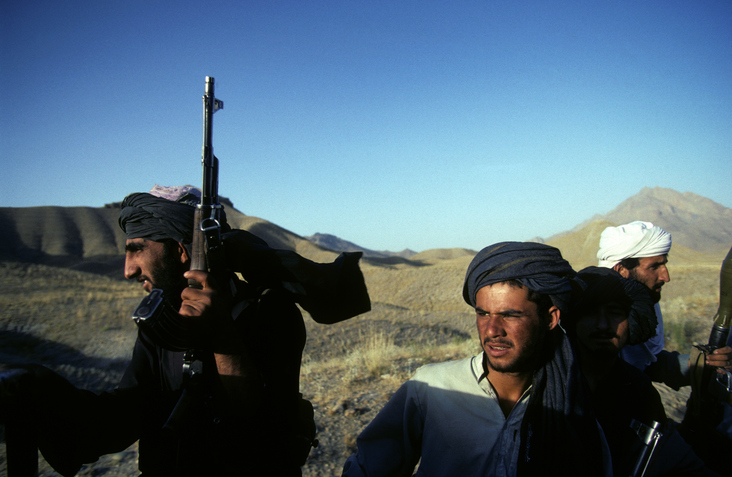Pakistani airstrikes kill 46 people in Afghanistan on 24 December. Pakistan claims it targeted a hideout of its homegrown terrorist group — the Tehreek-e-Taliban Pakistan to avenge the killings of 16 Pakistani soldiers by the T.T.P. three days ago. But the Afghan Taliban, which rules Kabul, is not entirely convinced. It says dozens of civilians, including women and children, are among the dead — a claim corroborated by the United Nations Assistance Mission in Afghanistan. Kabul lodges a formal protest with Islamabad over violation of its sovereignty. The Afghan Foreign Ministry issues a statement condemning the aggression by Pakistani Military at a time when Pakistan’s Special Envoy for Afghanistan was visiting Kabul for talks with Taliban officials. The Afghan Defence Ministry puts out a more strongly-worded statement, saying that Kabul will not let this cowardly act go unanswered. And true to form, the Afghan Taliban retaliates on 28 December by targeting Pakistani soldiers.
Taliban Spokesperson Zabihullah Mujahid says Pakistan bombarded four areas in the Barmal district of Afghanistan’s Paktika province. Across the border from Paktika lies North Waziristan, a district of Khyber Pakhtunkhwa province in Pakistan. North Waziristan has historically been a hive of militancy and was the target of a long-running Pakistani military offensive and U.S. drone strikes during the post-9/11 occupation of Afghanistan that saw many people take shelter in Afghanistan. Pakistan and the T.T.P. have been engaging in a series of tit-for-tat killings for some time now. In March 2024, Pakistan had carried out similar airstrikes in the border regions of Afghanistan.
So why are relations between Afghanistan and Pakistan descending into chaos? Let’s rewind a bit to understand what is happening and why. In September 2021, the then I.S.I. chief Faiz Hameed makes a triumphant visit to Kabul after the Taliban seizes Afghanistan. After all, Pakistan’s spy agency and its ideological fellow traveller, the Taliban, go back a long way. In fact, the Haqqani Network, a close Pakistani ally and a part of the Taliban, was the first to enter Kabul on 15 August 2021 — the day Afghanistan fell to the Taliban. Hameed is seen sipping tea in the foyer of a five-star hotel in the Afghan capital. He also interacts, briefly, with a Western journalist.
Cut to February 2023. Everything is not O.K. as Hameed’s successor, Nadeen Anjum, returns to Kabul, this time with Defence Minister Khawaja Asif in tow. The mood is far from celebratory because, apparently, the Taliban is no longer doing Pakistan’s bidding! And that’s something the Generals in Rawalpindi, who use Afghanistan for strategic depth and treat the Taliban as their proxy, simply cannot digest. What hurts them is that the T.T.P., which fought alongside the Taliban against the U.S.-backed NATO forces in Afghanistan, is now turning on Pakistan. Clearly, chickens have come home to roost for Pakistan that’s accused of being the epicentre of terrorism. What hurts the Pakistani Generals even more is that the Taliban is not persuading or prevailing upon the T.T.P. to stop its attacks inside Pakistan especially after the T.T.P. called off a ceasefire on 28 November 2022. Adding to their woes, all this is happening at a time when Pakistan’s economy is fragile and the country remains dependent on foreign aid.
Pakistan’s complaint is that the Afghan Taliban harbours the Tehreek-e-Taliban Pakistan. Pakistan’s Chargé d’Affaires in Kabul, Obaid Nizamani, met Taliban Defence Minister Mullah Yaqoob on 27 November. Afghanistan’s Chargé d’Affaires Sardar Ahmad Shakeeb, in turn, called on Deputy Prime Minister and Foreign Minister Ishaq Dar of Pakistan on 9 December. A Pakistani official says the Taliban has been repeatedly urged to take action against the T.T.P. but its response has been lukewarm. The T.T.P., formed in 2007, comprises a large number of Pakistani nationals who want to overthrow the Government in Islamabad and introduce Islamic law or Sharia in Pakistan.
Adding insult to Pakistan’s injury, some Taliban leaders are seeking to establish ties with its archrival, India. Taliban Defence Minister Mullah Mohammad Yaqoob has publicly been leading efforts to build relations with India, including urging the Indian Government to train Taliban forces. In fact, in November 2024, an Indian diplomat called on Yaqoob in Kabul. Yaqoob is the son of Taliban founder and the late supreme leader Mullah Omar. India, like much like the rest of the world, does not recognise the Taliban regime but it re-opened its mission in Kabul in June 2022. Since then, India has provided humanitarian aid, including wheat and medicines, for the Afghan people.
On the other hand, the Taliban’s list of complaints against Pakistan is longer. Taliban resents Pakistan for expelling 5 hundred-thousand undocumented Afghan migrants. The Taliban is also miffed with Pakistan for not recognising its Government in Kabul unlike 2001 when Pakistan was only one of three countries to recognise the Taliban Government. Given the difficulties in its ties with Pakistan, Taliban has been distancing itself from its former benefactor in order to show its independence to foreign donors.
The two neighbours have another long-standing dispute. Afghanistan does not recognise the 2,640-kilometre-long Durand Line, drawn by the British colonialists in 1893, as its border with Pakistan. It has been a source of tension for decades on end. Pakistan has tried to harden the traditionally soft border with Afghanistan through trenching and fencing, but its efforts have met with hostility from Kabul.














